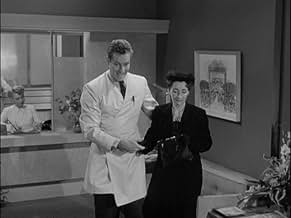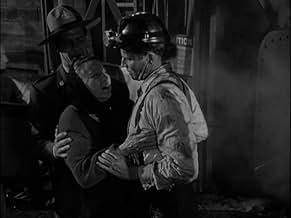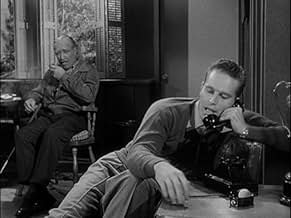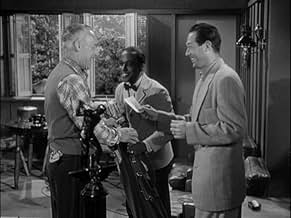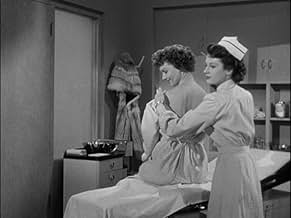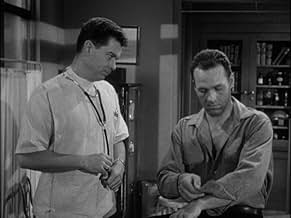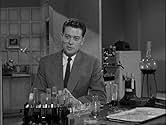IMDb रेटिंग
5.8/10
1.1 हज़ार
आपकी रेटिंग
अपनी भाषा में प्लॉट जोड़ेंA doctor returning from the Korean War to his hometown in Pennsylvania must choose what next to do with his life.A doctor returning from the Korean War to his hometown in Pennsylvania must choose what next to do with his life.A doctor returning from the Korean War to his hometown in Pennsylvania must choose what next to do with his life.
Philip Ahlm
- Minor Role
- (बिना क्रेडिट के)
Elsie Baker
- Mrs. Olzoneski
- (बिना क्रेडिट के)
Mary Benoit
- Party Guest
- (बिना क्रेडिट के)
फ़ीचर्ड समीक्षाएं
Charlton Heston and Lizabeth Scott are "Bad for Each Other" in this predictable 1953 film, also starring Mildred Dunnock, Arthur Franz, Marjorie Rambeau, and Dianne Foster.
Heston plays a doctor who returns from the service to the coal town where he grew up. After meeting the wealthy, twice-married, shallow Scott, he decides not to stay in the service and becomes a society doctor, in it for the money. The nurse he hires to work for him (Foster) thinks he's better than that.
The role played by Arthur Franz, that of a young doctor who admires him and doesn't mind going into the trenches, is essentially Heston's conscience.
I found this film pretty bland, but the big problem for me was that the main character as portrayed by Heston was just not likable. He wasn't likable before he took up with Scott nor was he likable throughout the film. Some of this was in the script, but some of it was in his line readings. He had fat attitude every time he opened his mouth. Frankly I didn't care what he did.
Lizabeth Scott was best earlier in her career, in her noir days, where her great voice, sexy blond looks, and ambiguous performances fit very well. Her character in this also was annoying. Now, she's not supposed to be likable, but we should have been able to see why Heston liked her. She seemed awfully pushy for his character to have put up with her.
Heston was tall, handsome, with a great voice and a dominating presence. This film was unfortunately directed in a somewhat old-fashioned manner so as to seem melodramatic and over the top. When someone with that strong a screen persona is directed that way, his performance becomes too actor-y.
Nothing special.
Heston plays a doctor who returns from the service to the coal town where he grew up. After meeting the wealthy, twice-married, shallow Scott, he decides not to stay in the service and becomes a society doctor, in it for the money. The nurse he hires to work for him (Foster) thinks he's better than that.
The role played by Arthur Franz, that of a young doctor who admires him and doesn't mind going into the trenches, is essentially Heston's conscience.
I found this film pretty bland, but the big problem for me was that the main character as portrayed by Heston was just not likable. He wasn't likable before he took up with Scott nor was he likable throughout the film. Some of this was in the script, but some of it was in his line readings. He had fat attitude every time he opened his mouth. Frankly I didn't care what he did.
Lizabeth Scott was best earlier in her career, in her noir days, where her great voice, sexy blond looks, and ambiguous performances fit very well. Her character in this also was annoying. Now, she's not supposed to be likable, but we should have been able to see why Heston liked her. She seemed awfully pushy for his character to have put up with her.
Heston was tall, handsome, with a great voice and a dominating presence. This film was unfortunately directed in a somewhat old-fashioned manner so as to seem melodramatic and over the top. When someone with that strong a screen persona is directed that way, his performance becomes too actor-y.
Nothing special.
(1953) Bad For Each Other
DRAMA
Co-written and directed by Irving Rapper that opens with a colonel, Thomas Owen (Charlton Heston) or Tom for short coming back to a mining town, Coalville and finds out his brother had long been past, that he may not be on the up and up as told by mother, Mrs. Mary Owen (Mildred Dunnock). So he then goes and visits the owner of the coal mine, Dan Reasonover (Ray Collins) and finds out that he stole and owed money to the coal mining comp as well as the owner Reasonover. During this, Dan Reasonover's daughter, Helen Curtis then becomes infatuated by him and tries to convince him to become a doctor for the upper class as a profession and drop from being one for the army. He does, and at the same time falls for Helen and let's her to drop what he wanted to do to become an associate for Dr. Homer Gleeson (Lester Matthews). And while he is in love with Helen, both Tom's own mother as well as Helen's dad disapproves of the match once he proposes to her.
The dilemma unfolds when Tom decides to break ethic rules by letting his boss Dr. Homer Gleeson to take full credit for a surgery he had done, forcing the nurse he had recently hired and respects to move to quit working for him and work for a much smaller clinic for the workers of Coalville.
It is kind of odd, this movie was selected to be shown on TCM Eddie Muller's Noir Alley when the overall experience is more drama than noir. And upon listening to Eddie Muller both from the introduction and afterward, I do not recall, why he thought this was film noir as their was no murder involve at all, but just some dilemmas.
Co-written and directed by Irving Rapper that opens with a colonel, Thomas Owen (Charlton Heston) or Tom for short coming back to a mining town, Coalville and finds out his brother had long been past, that he may not be on the up and up as told by mother, Mrs. Mary Owen (Mildred Dunnock). So he then goes and visits the owner of the coal mine, Dan Reasonover (Ray Collins) and finds out that he stole and owed money to the coal mining comp as well as the owner Reasonover. During this, Dan Reasonover's daughter, Helen Curtis then becomes infatuated by him and tries to convince him to become a doctor for the upper class as a profession and drop from being one for the army. He does, and at the same time falls for Helen and let's her to drop what he wanted to do to become an associate for Dr. Homer Gleeson (Lester Matthews). And while he is in love with Helen, both Tom's own mother as well as Helen's dad disapproves of the match once he proposes to her.
The dilemma unfolds when Tom decides to break ethic rules by letting his boss Dr. Homer Gleeson to take full credit for a surgery he had done, forcing the nurse he had recently hired and respects to move to quit working for him and work for a much smaller clinic for the workers of Coalville.
It is kind of odd, this movie was selected to be shown on TCM Eddie Muller's Noir Alley when the overall experience is more drama than noir. And upon listening to Eddie Muller both from the introduction and afterward, I do not recall, why he thought this was film noir as their was no murder involve at all, but just some dilemmas.
Army surgeon Charlton Heston is happy with his work, but a visit home to the coal-mining town he was born in,as well as society vamp Lizabeth Scott, make him think there's more to life than patching up wounded soldiers. At first he's interested in serving the poor people he grew up with. However Miss Scott gets him a job with society doctor Lester Matthews and becomes engaged to him. He finds his practice consists largely of giving nostrums to wealthy women at $250 a visit. Finally his nurse, Dianne Foster, leaves him to assist Dr. Arthur Franz, who's taking care of the miners and their families. His crisis of faith, however, is yet to come.
Heston has already developed his deep-throated growl in this movie, although he has not perfected it. It has a quality to it that I think is supposed to denote dissatisfaction, but sounds whiny to me. In a world where everyone else struggles for status and wealth, it's up to the woman at the top of both trees to point out the necessity of honesty and honor; well, she's the only one who can.
Heston has already developed his deep-throated growl in this movie, although he has not perfected it. It has a quality to it that I think is supposed to denote dissatisfaction, but sounds whiny to me. In a world where everyone else struggles for status and wealth, it's up to the woman at the top of both trees to point out the necessity of honesty and honor; well, she's the only one who can.
This film is an 83 minute sermon on selflessness vs selfishness, with particular emphasis on the medical profession. The dialogue is full of grandiose turns of phrase that often mean nothing and do not advance the plot. No one's acting stands out because almost everyone is playing a one-dimensional type.
Charlton Heston stars as the only character with any choices to make or an arc to follow. At the start of the story, he plays a skilled military surgeon on leave after the death of his brother. He is initially content to remain in the army where he has been doing good. However, immediately upon arriving in his old hometown, he is offered two positions in private practice. One serving the poor for little pay, one coddling the wealthy for big bucks. He doesn't even have to think about it. Lizabeth Scott plays his new girlfriend, although there is no chemistry between them at all. They both profess their love for the other, but his interest in her seems to be her rich friends, her interest in him is his status as the current fashion.
In case Heston's "bad choices" are not obvious enough, another young doctor and a nurse who both care more about people than money are provided for contrast. Both came to town because they were so impressed by Heston when he was a "real" doctor while in the army. Could that mean he might yet choose the right path?
Finally, to underline the film's version of right vs wrong choices even further is Mildred Dunnock as Heston's mother. She proudly lives in poverty and is distressed that her two sons both preferred a wealthy lifestyle and the corrupting influence of rich women. Neither of her sons appear to have done anything to help out their mother, not for any reason explained in the script, but just because for the sake of the film, everyone must be identified as poor or rich.
Subtle this script is not. Once everything is set up for us, with all the "correct" choices clearly flagged, the rest of the film is just following a predictable path (with some nonsensical speeches) until Heston reaches all the right conclusions.
Charlton Heston stars as the only character with any choices to make or an arc to follow. At the start of the story, he plays a skilled military surgeon on leave after the death of his brother. He is initially content to remain in the army where he has been doing good. However, immediately upon arriving in his old hometown, he is offered two positions in private practice. One serving the poor for little pay, one coddling the wealthy for big bucks. He doesn't even have to think about it. Lizabeth Scott plays his new girlfriend, although there is no chemistry between them at all. They both profess their love for the other, but his interest in her seems to be her rich friends, her interest in him is his status as the current fashion.
In case Heston's "bad choices" are not obvious enough, another young doctor and a nurse who both care more about people than money are provided for contrast. Both came to town because they were so impressed by Heston when he was a "real" doctor while in the army. Could that mean he might yet choose the right path?
Finally, to underline the film's version of right vs wrong choices even further is Mildred Dunnock as Heston's mother. She proudly lives in poverty and is distressed that her two sons both preferred a wealthy lifestyle and the corrupting influence of rich women. Neither of her sons appear to have done anything to help out their mother, not for any reason explained in the script, but just because for the sake of the film, everyone must be identified as poor or rich.
Subtle this script is not. Once everything is set up for us, with all the "correct" choices clearly flagged, the rest of the film is just following a predictable path (with some nonsensical speeches) until Heston reaches all the right conclusions.
Charlton Heston ("Col. Owen") returns from almost ten years as an army surgeon to his Pennsylvania home to find that his dead brother has been accused of sloppy practices that caused fatalities at a coal mine. His mother (Mildred Dunnock) and local doctor "Scobee" (Rhys Williams) hope he will stay and help the local community, but he discovers that his late brother had run up quite a bit of debt and determines to pay it back. A chance meeting with the "Helen" (Lizabeth Scott) - the daughter of the man who holds the debt - introduces him to new opportunities. She is wealthy, twice divorced, and well connected. His quick thinking after an incident at a party sees an association with prominent, and rather venal, doctor "Gleeson" (Lester Matthews) offer him a route to success and prosperity. Along the way, he proposes to "Helen" and all looks set fair. Much of this film takes a swipe at the hypochondriac patients - mostly wealthy women - and at the physicians who are little better than charlatans; charging a small fortune for glorified Alka Seltzer. Will "Owen" continue to be satisfied with this increasingly unfulfilling existence or will his innate instincts developed during wartime send him back to tend to the more legitimate and urgent needs of the community at large? Heston is a bit on the wooden side here, he delivers his dialogue rather stiltedly and without much passion. Scott is adequate - but more as an effective conduit for the decisions the doctor might make, and there is a decent, if sparing, contribution from Dianne Foster as the voice of reason in the man's increasingly conflicted life - and not just professionally, either. It's way too wordy but it does offer food for thought about practices that probably still exist today and is a bit better than I was expecting.
क्या आपको पता है
- ट्रिवियाAccording to December 1950 articles in The Hollywood Reporter and the Los Angeles Times, producer Hal B. Wallis purchased the rights to the novel before it was published for $100,000 ($1.3M in 2024). Wallis intended the leads to be Burt Lancaster and Patricia Neal and that the project was to be filmed at Paramount. It never got off the ground, and Wallis ended up selling the rights to Columbia in early 1953.
- गूफ़The beginning scenes of movie show coal mine operations in Coalville, PA. The railroad caboose was from ATSF (Atchison, Topeka, and Santa Fe). That railroad never had operations in Pennsylvania.
- भाव
Dr. Tom Owen: [on the phone with his wife] Oh, I'm interviewing nurses, of course... Don't be silly, darling - of course she'll be fat and ugly. I do insist on good legs, though.
टॉप पसंद
रेटिंग देने के लिए साइन-इन करें और वैयक्तिकृत सुझावों के लिए वॉचलिस्ट करें
- How long is Bad for Each Other?Alexa द्वारा संचालित
विवरण
- चलने की अवधि
- 1 घं 23 मि(83 min)
- रंग
इस पेज में योगदान दें
किसी बदलाव का सुझाव दें या अनुपलब्ध कॉन्टेंट जोड़ें

